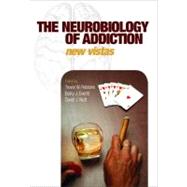
Note: Supplemental materials are not guaranteed with Rental or Used book purchases.
Purchase Benefits
What is included with this book?
| Contributors | p. vii |
| Introduction: The neurobiology of drug addiction - new vistas | p. 1 |
| Theories of Drug Addiction | |
| Neurobiological mechanisms for opponent motivational processes in addiction | p. 7 |
| Neural mechanisms underlying the vulnerability to develop compulsive drug-seeking habits and addiction | p. 25 |
| The incentive-sensitization theory of addiction: Some current issues | p. 45 |
| The neurobiology of relapse | p. 61 |
| Extending the Concept of Addiction | |
| Neurobiology of nicotine dependence | p. 85 |
| Cognitive and emotional consequences of binge drinking: Role of amygdala and prefrontal cortex | p. 101 |
| The neurobiology of pathological gambling and drug addiction: An overview and new findings | p. 119 |
| Overlapping neuronal circuits in addiction and obesity: Evidence of systems pathology | p. 135 |
| Vulnerability to Drug Abuse | |
| Neurogenetic studies of alcohol addiction | p. 153 |
| Genetics of addictions: Strategies for addressing heterogeneity and polygenicity of substance use disorders | p. 171 |
| Characterizing organism × environment interactions in non-human primate models of addiction: PET imaging studies of dopamine D2 receptors | p. 187 |
| Context-induced relapse to drug seeking: A review | p. 203 |
| Causes and Consequences of Addiction | |
| Transcriptional mechanisms of addiction: Role of ¿FosB | p. 223 |
| Parallel studies of neural and cognitive impairment in humans and monkeys | p. 241 |
| Acute effects of cocaine on the neurobiology of cognitive control | p. 257 |
| Evidence-based treatments of addiction | p. 273 |
| Concluding summary and discussion: New vistas | p. 289 |
| Index | p. 299 |
| Table of Contents provided by Ingram. All Rights Reserved. |
The New copy of this book will include any supplemental materials advertised. Please check the title of the book to determine if it should include any access cards, study guides, lab manuals, CDs, etc.
The Used, Rental and eBook copies of this book are not guaranteed to include any supplemental materials. Typically, only the book itself is included. This is true even if the title states it includes any access cards, study guides, lab manuals, CDs, etc.